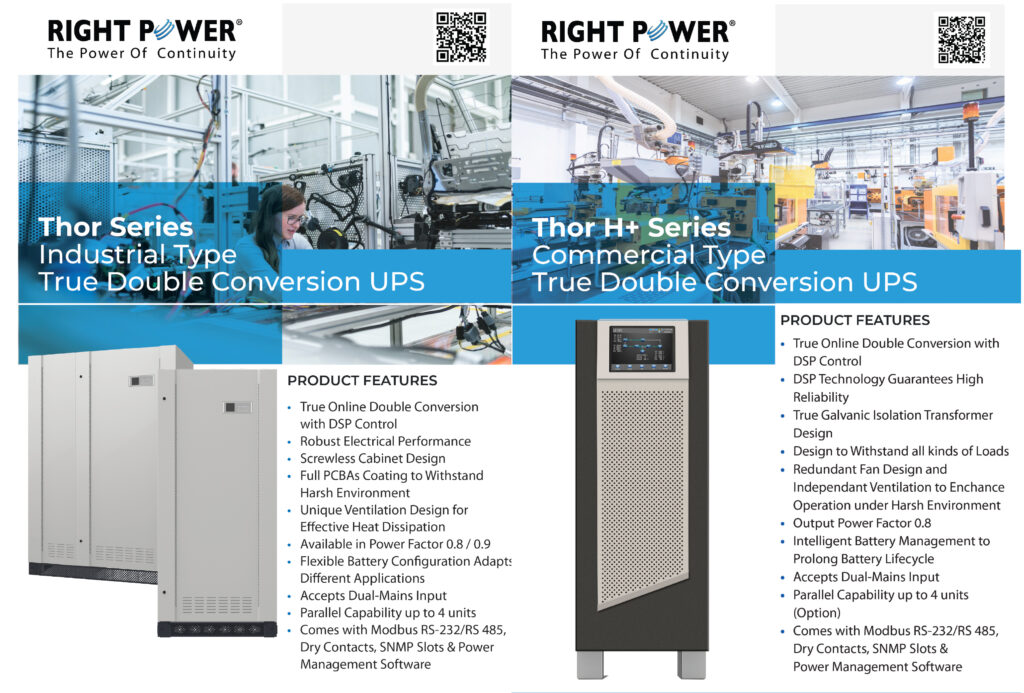
In industrial settings, maintaining a high-quality power supply is essential for the reliable operation of critical equipment and processes. Power disturbances, such as voltage sags, surges, harmonics, and outages, can lead to costly downtime, production losses, and potential damage to machinery. Uninterruptible Power Supply (UPS) systems play a vital role in enhancing power quality and ensuring uninterrupted operations in industrial environments. In this blog post, we will explore how industrial UPS system improve power quality and address common power-related challenges in industrial settings.
Voltage Regulation:
One of the primary functions of UPS systems is voltage regulation. Voltage sags and swells can occur due to various reasons, including grid fluctuations, large equipment startups, or electrical faults. UPS systems monitor the incoming voltage and provide a stable output voltage, keeping it within acceptable limits to prevent damage to sensitive equipment.
Mitigating Voltage Surges and Spikes:
Voltage surges and spikes, often caused by lightning strikes or sudden power surges in the grid, can be detrimental to industrial equipment. UPS systems act as a buffer against these transient voltage fluctuations, absorbing excess energy and safeguarding connected devices.
Protection Against Power Outages:
Power outages can lead to immediate disruptions in industrial processes, resulting in lost production time and potential data loss. UPS systems provide backup power during such situations, allowing for a graceful shutdown of equipment or providing sufficient runtime for critical processes to continue running until the main power supply is restored.
Filtering Harmonics:
Harmonics, which are non-linear electrical waveforms, can distort the power supply and cause problems like overheating in motors, transformers, and other equipment. UPS systems equipped with harmonic filters help mitigate these issues by reducing harmonic distortion and improving overall power quality.
Isolation from Grid Irregularities:
The electrical grid may experience fluctuations and irregularities due to factors beyond the control of industrial facilities. UPS systems act as an electrical buffer, isolating the connected equipment from grid disturbances, and ensuring stable power delivery.
Frequency Regulation:
In certain industrial applications, maintaining a precise frequency is critical for the proper functioning of equipment. UPS systems with frequency regulation capabilities ensure that the output frequency remains stable, even if the input frequency fluctuates.
Reduced Downtime and Increased Productivity:
By providing seamless power backup and enhanced power quality, UPS systems help reduce downtime due to power-related issues. This increased uptime translates to improved productivity and reduced financial losses for industrial operations.
Extending Equipment Lifespan:
Fluctuations and disturbances in power can significantly impact the lifespan of industrial machinery and electronics. UPS systems contribute to prolonging the life of equipment by providing clean, stable power and protecting devices from potential damage.
In conclusion, UPS systems play a crucial role in enhancing power quality and ensuring uninterrupted operations in industrial environments. By addressing voltage irregularities, mitigating power disruptions, and filtering out harmonics, UPS systems safeguard industrial equipment and processes, reducing downtime and increasing productivity. Investing in a reliable industrial UPS system tailored to specific industrial needs is a proactive measure to maintain a stable power supply and protect valuable assets from the adverse effects of power disturbances.
How do industrial UPS systems work
Industrial UPS (Uninterruptible Power Supply) systems function as a critical safeguard against power disruptions in industrial settings. These systems work by continuously monitoring the incoming power supply. In the event of voltage sags, surges, or outages, the UPS system swiftly switches to its internal battery reserves. Through an inverter, it converts stored DC power into AC power, providing an uninterrupted and stable power source to connected equipment. This seamless transition ensures that industrial processes remain unaffected by power disturbances, preventing downtime, data loss, and potential damage to machinery. Additionally, some advanced industrial UPS system offer power conditioning features, filtering out harmonics and regulating voltage and frequency, further enhancing the quality of power supplied to sensitive industrial equipment.
Right Power Technology, founded in 2000, as a pioneer in developing and manufacturing advanced UPS systems and solutions, Right Power Technology now has the enviable distinction of being a significant player in the industry, education, and commercial fields. All of our UPS for server rooms are equipped with the latest power management software, designed to provide real-time data of UPS connected and managing the UPS through Java applet and Web Browser, providing simultaneous data acquisition. At Right Power, we believe in providing products of superior quality with our professional technical support and unsurpassed customer service. Visit our official website to see the best battery backup suited to your requirements- https://www.rightpowerups.com.my/


